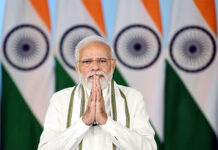
According to a leading immunologist, a new coronavirus strain has been identified in Sri Lanka that is airborne and more active than any previously discovered in the country. According to Neelika Malavige, the head of the Department of Immunology and Molecular Sciences at Sri Jayawardenapura University, the highly transmissible form can stay airborne for nearly an hour and is spreading quickly.
“This coronavirus strain is more strongly transmissible than the others detected on the island so far. The latest strain is airborne, with droplets that can last nearly an hour in the air “according to Malavige.
Following last week’s New Year’s festivities, health officials worried that the new strain was quickly spreading, with more younger people being sick.
“The disease could advance to a third wave in the next two incubation stages,” said Upul Rohana of the Public Health Inspectors, adding that the true condition will appear only in the next 2-3 weeks.
Meanwhile, the COVID prevention ministry released new recommendations that will be in effect until May 31.
Most establishments are required to operate at a 50% capacity, and all modes of revelry are prohibited. The number of cases in the region, which was about 150 before the New Year in mid-April, has now risen to over 600 a day.
Sri Lanka, like many other countries, is seeing an increase in coronavirus infections, with a current total of 99,691 cases and 638 deaths attributed to the virus.
Hospitals still have adequate ICU ability to handle COVID-19 patients, according to Director-General of Health Services Dr. Asela Gunawardena, but it’s more necessary to meet health recommendations to prevent infection.
“Previously, the signs and symptoms were not very obvious. They have become much more noticeable in recent years, and young people are more likely to develop them “he said.
Many that test positive now have further respiratory problems, necessitating ICU admission and oxygen, according to him.
Sri Lanka is not the only Asian country to have seen a new strain of COVID-19, with India, Pakistan, and Indonesia among the others.









